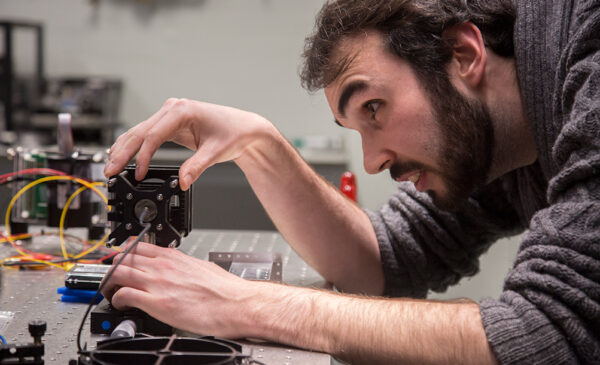Small and medium-sized businesses within the Great Birmingham and Solihull LEP (GBSLEP) region will be given a unique opportunity to access specialist technical equipment through the launch of the new Quantum Technology Innovation Hub (QTIH) at the University of Birmingham.
The Hub is hosted by the Centre for Innovation in Advanced Measurement in Manufacturing (CIAMM) in partnership with GBSLEP. It offers specialist equipment to enable research, experimentation and detailed product testing for a wide range of businesses, particularly in the engineering, manufacturing and telecommunications sectors. Experts at the UK Quantum Technology Hub Sensors and Timing – also based at the University of Birmingham – will be available to advise on usage and technological development.
Set up in 2018, CIAMM has already provided free support and collaboration with hundreds of businesses supporting them in discovering the full potential of quantum technologies and the world-leading expertise offered by the University of Birmingham, helping to drive innovation in the local economy.

The new Hub will expand this support, offering access to equipment such as high specification lasers, perfect for thermal tuning and supporting quantum optics. The Hub’s impressive Frequency Comb will also allow the measurement of absolute frequencies and enabled stabilisation of continuous wave lasers. This item of equipment is particularly core to quantum technologies, as it allows for cold atom manipulation experimentation. Finally, the RF Spectrum Analyser delivers extremely high sensitivity for phase noise measurements, which will be of particular interest to electronic engineers and optics technicians.
“We are hoping to engage with the local business community to encourage and develop the use of quantum technology in commercial products. The addition of these essential items of equipment will provide an accessible gateway for small businesses to become more technologically competent and quantum-ready for the future. At the UK Quantum Technology Hub Sensors and Timing, we already engage with over 70 nationwide industry partners, and with the QTIH we are looking to boost Birmingham’s business community.”Professor Kai Bongs, Principal Investigator, UK Quantum Technology Hub Sensors and Timing, and Co-Investigator for this project
“GBSLEP’s investment of £3m in the Quantum Innovation Hub shows our commitment to enabling innovation in the West Midlands. As a business-led organisation we look to create opportunities for inclusive economic growth. We believe this new Hub is a much needed space for small and medium sized firms to experiment, test and commercialise their research and development work. This project is a great example of how we collaborate with our academic, public and private sector partners to identify projects that drive forwards the modernisation of advanced manufacturing and engineering.”Chair of Greater Birmingham and Solihull LEP, Tim Pile
The University will also be investing in a magnetically shielded room, which will allow users to build and test on human subjects. Provided by Cerca Magnetics, a spin-out company launched by Quantum Technology Hub academics at the University of Nottingham, the room contains multi-layers of mu-metal and degaussing coils installed in the walls. The superbly low geomagnetic field will facilitate successful operations with ultra-sensitive magnetometers.
Equipped with a quality projector, eyetracker and sound delivery system, the room will be especially suited for testing sensors designated for magnetoencephalography (MEG), a functional neuroimaging technique for mapping brain activity by recording magnetic fields produced by electrical currents occurring naturally in the brain.
If you would like to access the QTIH, or would like more information, please contact Julian Moore, Business Engagement Manager at CIAMM, at [email protected].
Notes for Editors
About the University of Birmingham
The University of Birmingham is ranked amongst the world’s top 100 institutions. Its work brings people from across the world to Birmingham, including researchers, teachers and more than 6,500 international students from over 150 countries.
About the UK Quantum Technology Hub Sensors and Timing
The UK Quantum Technology Hub Sensors and Timing (led by the University of Birmingham) brings together experts from Physics and Engineering from the Universities of Birmingham, Glasgow, Imperial, Nottingham, Southampton, Strathclyde and Sussex, NPL, the British Geological Survey and over 70 industry partners. The Hub has over 100 projects, valued at approximately £100 million, and has 17 patent applications.
The UK Quantum Technology Hub Sensors and Timing is part of the National Quantum Technologies Programme (NQTP), which was established in 2014 and has EPSRC, IUK, STFC, MOD, NPL, BEIS, and GCHQ as partners. Four Quantum Technology Hubs were set up at the outset, each focussing on specific application areas with anticipated societal and economic impact. The Commercialising Quantum Technologies Challenge (funded by the Industrial Strategy Challenge Fund) is part of the NQTP and was launched to accelerate the development of quantum enabled products and services, removing barriers to productivity and competitiveness. The NQTP is set to invest £1B of public and private sector funds over its ten-year lifetime.
About the Greater Birmingham and Solihull Local Enterprise Partnership (GBSLEP)
GBSLEP is a partnership of business, public sector and further and higher education. Its mission is to drive sustainable economic growth across the city-region, creating jobs and improving the quality of life for everyone.
The GBSLEP area spans nine local authority areas: Birmingham, Solihull, East Staffordshire, Cannock Chase, Lichfield, Tamworth, Redditch, Bromsgrove and Wyre Forest. It is home to over two million people, an estimated 1,038,000 jobs, and an economy worth £46.8bn.
Since 2010, the government has awarded GBSLEP £433 million to invest in a range of projects to grow the local economy. These include transport infrastructure, skills development, business support, innovation, and cultural and creative assets. GBSLEP is on course to secure more than £300 million of additional public and private investments, which will create a further 29,000 jobs and 7,000 new homes.
Since 2010, more than 162,000 new private sector jobs have been created across Greater Birmingham and Solihull. Last year, the area generated a 2.9% increase in economic growth – making it the fastest growing core city LEP in area in the country. More than 7,000 businesses have been supported by the GBSLEP Growth Hub in the past two years.
For more information about GBSLEP, please visit the website, subscribe to its newsletter or follow on Twitter and LinkedIn.




